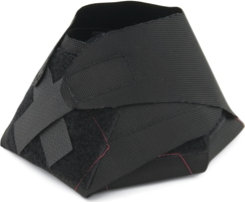If you are like me, you are always evaluating your horse's manure, whether in a stall, corral or on the trail. Sometimes I'll be riding with people who see me do a short circle around a manure pile that my horse just dropped and sometimes I get asked why? The reason I do this is that you can get an idea on the health of horse or maybe get a lead on emerging problems by evaluating their manure.
I'm not only looking at what the manure looks like, but how many piles that horse will drop in a given day, and each horse is different. My quarterhorses and grade horses will drop 9 to 12 piles a day, while my Mustang only drops 6 to 7 piles a day. Any quantity much different and that horse bears watching just a little more closely.
Each horse's normal manure will look different. Some horses normal manure will be flakey and sometimes break apart when hitting the ground; other horses may drop smaller piles with balls more roundish than not; and yet others may drop egg shaped balls. If I put all my horses in one corral I can tell what manure pile belongs to what horse which is helpful on determining if any one horse is dropping significantly less piles than normal, which can be indicative of a looming problem, usually dehydration and subsequent colic.
Normal manure is generally formed manure balls that appear to be a little wet. If they are not glistening with moisture then I would not get worried unless they appear to have a mucous type covering. After a while you'll know what is normal for that horse and what is not. The picture of manure at right is pretty normal.
Very dry piles can lead you to believe that the horse may be hydrated. Sometimes I'll soak his hay in water for a couple feeding to see if he gets moisture back into his manure. If I have been watching that horse then I see mucous on the manure then I would absolutely call my Vet.
Manure piles that are somewhat or mostly unformed, like the picture at left, could be a result of sickness or discomfort, from sand or a change of feeds. The manure in the picture wouldn't spin me up unless it started becoming worse - wetter and less formed.
Runny and unformed manure piles, almost looking like a cow pie, can be indicative of sand in the gut. My Vet tells me that some horses can have as much as 80 lbs of sand in the gut. The horse's system will drive fluid to the gut to help remove it, hence the wet unformed piles. Dehydration becomes a real threat from this.
You can test for sand by collecting some of the manure that hasn't contacted the ground and put it into a quart sized ball jar. I'll put about 3-4 inches of manure in the jar, then fill with water, shake and let it settle for 15-20 minutes. If there is sand in the gut, it will settle to the bottom of the jar and be visible. The picture at right is manure, like a cow pie, likely caused by too much sand. And while it is likely feed issues cause digestive problems which you see in the manure, I also think that, in some horses, their manure can show increased stress.
If sand is present, especially in any quantity, you need to take action. I will never hesitate to call my Vet, but I also try to stop problems before I call her. I use Sand Clear, a pelleted psyllium seed husk supplement, that I add to my horses fortified feed for a five day period every 4 to 5 weeks, and on one horse in particular I usually put him through a 10 day regime of Sand Clear once every 4 - 5 weeks as he seems to take in more sand than the other horses.
I think that some horses, particularly older horses, may benefit from pro-biotics. I feed pro-bios in paste form, about every six days, to a couple of my horses. While I think it may be helpful, I just don't know for sure.
Another thing to look for in your horse's manure piles is bits and pieces of undigested feed. This can be because your horse is not chewing his feed completely enough - maybe a problem that can be fixed with getting his teeth floated. Again, preventive care in the form of routine dental exams is a good idea. Have a safe, and healthy journey.





















No comments:
Post a Comment